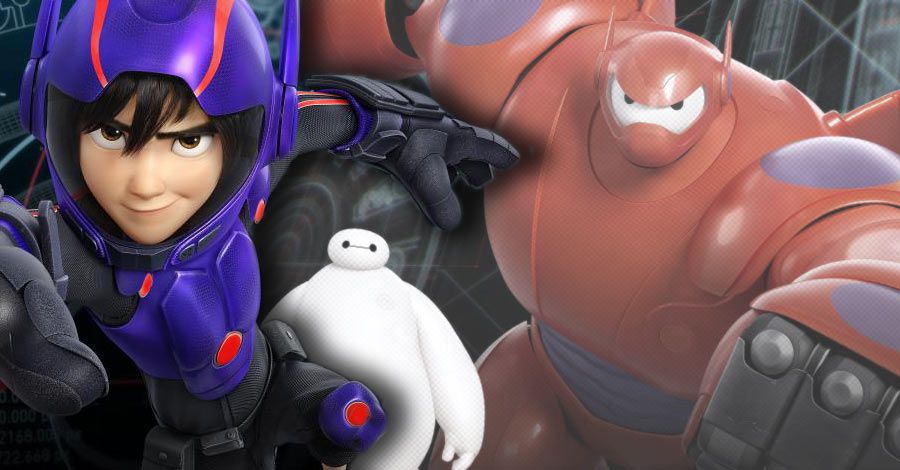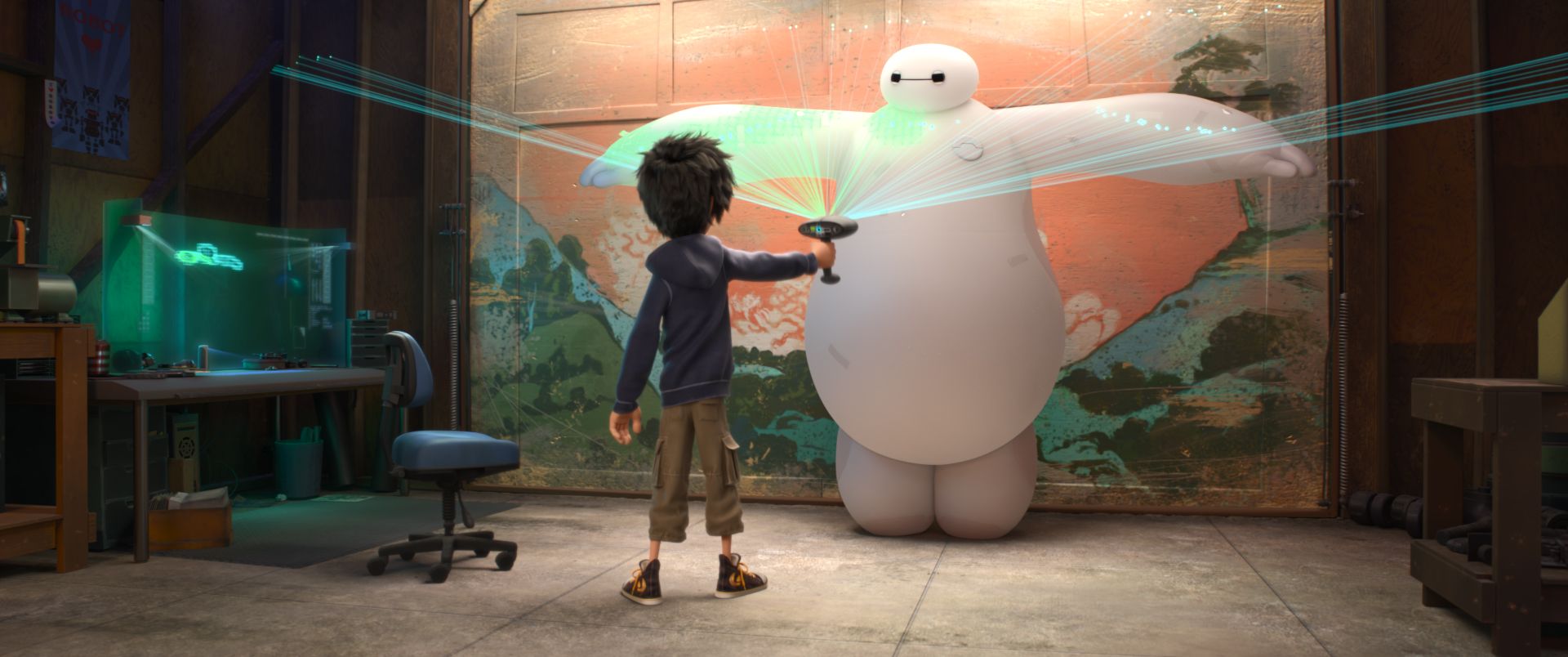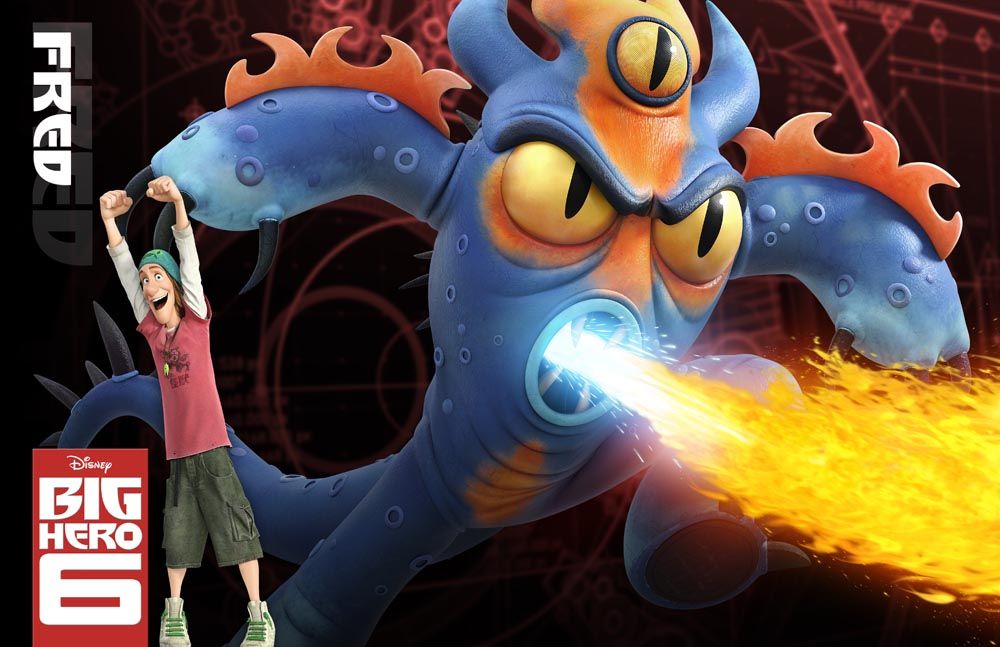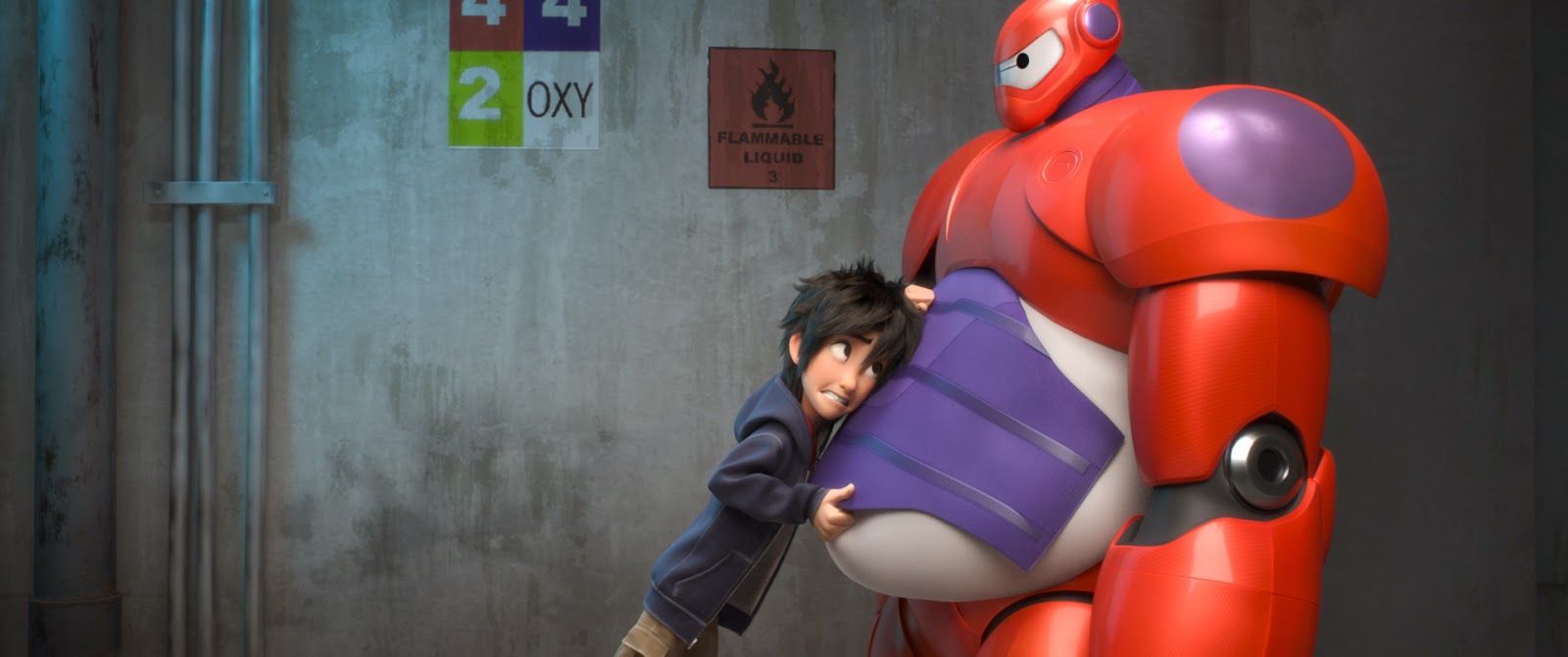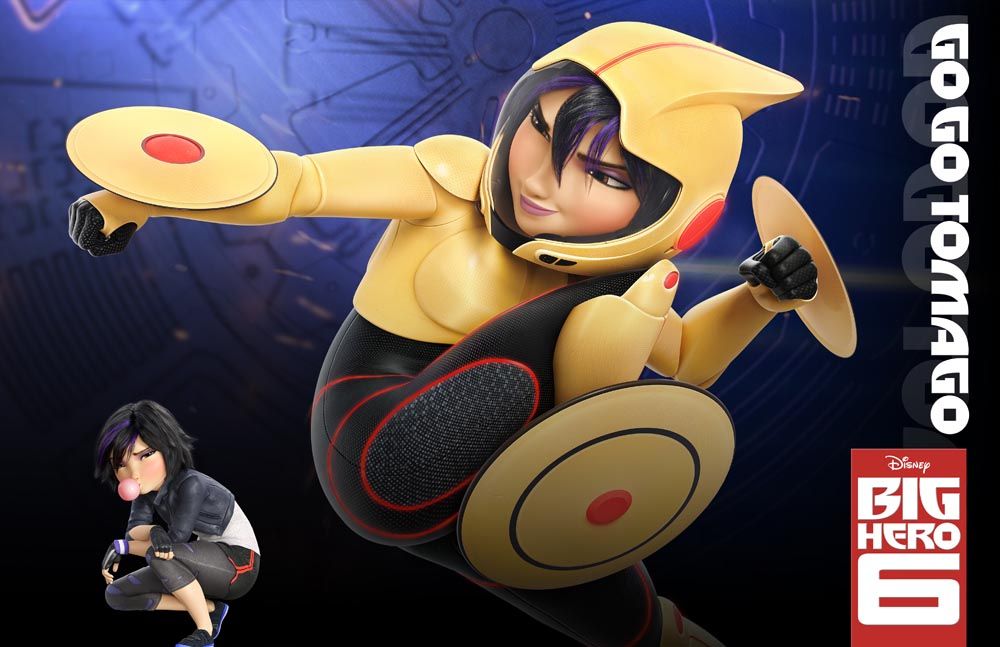When it came to bringing the somewhat obscure Marvel Comics series "Big Hero 6" to the big screen, directors Don Hall and Chris Williams followed a simple, self-imposed mandate: go big or go home.
Following Disney's acquisition of Marvel Entertainment in 2009, Hall -- who previously helmed Disney's 2011 "Winnie the Pooh" film and worked on the stories and screenplays for several of the studio's films, including "Tarzan," "Meet the Robinsons" and "The Princess and the Frog" -- and Williams -- whose Disney projects include co-directing and co-writing "Bolt" and story artist work on "Frozen" and "Tangled") -- scoured through the various and sundry comic book properties looking for concepts and characters that would both work well in Disney's animated medium and stand up well beyond the scope of the Marvel Cinematic Universe.
RELATED: Disney Debuts First Full Trailer for Marvel's "Big Hero 6"
Targeting a lesser-known team of Japanese superheroes that had appeared sporadically in guest spots and limited series since 1998, the filmmakers dropped some of the most familiar faces -- including "X-Men" mainstays Sunfire and Silver Samurai -- in favor of a funkier group of youthful adventurers who rally around the central protagonists: the brilliant teenage prodigy Hiro and the protective inflatable vinyl robot Baymax, who helps Hiro weather the loss of his older brother and realize his own heroic potential. The result, based on early footage previewed for the press, is a unique, fresh take on the superhero genre that combines the best elements of the animation artistry and emotional storytelling of Disney with the dynamism and adventurous spirit of Marvel, packaged within a lush, anime-inspired aesthetic and the warm human touch of films like "My Bodyguard."
During an advanced preview of the film, which will be released in theater Nov. 7, Hall and Williams spoke with CBR News about assembling the big screen version of "Big Hero 6" from the building blocks inherent within both Disney and Marvel traditions and creating something completely distinctive along the way.
CBR News: When you got this great opportunity to pitch some Marvel stuff, what was it about the comic book "Big Hero 6" that stuck out and made you say, "I see a Disney film in here somewhere"?
Don Hall: Well, first it was the title that I gravitated toward because I never read it. And the title led me to it. It was just very intriguing -- like, "'Big Hero 6?' I mean, what is that? I've never heard of that." Then I saw a Japanese superhero team, and I recognized a couple of the [characters] -- Sunfire and Silver Samurai -- and I think what impressed me most about it is that it was a spirit to the book that was just fun. The characters felt very appealing and entertaining, and mostly, like the [Chris] Claremont run that came a little later, the characters that we're taking -- Wasabi, and all that -- and the whole thing was sort of this love of the Japanese pop culture. Everybody here, we're big [Hayao] Miyazaki fans. A lot of people love anime. We love anime, so it just felt really appropriate for this place. And then just the idea of crafting a relationship between a kid and a robot, just felt like we could really run with that.
Chris Williams: Yeah, we definitely love challenges here, and so the idea of looking at a story like this that has these anime influences and has this really challenging story idea of a kid who loses his brother, and then the robot becomes the surrogate brother, were really excited about that. And we didn't know what it would ultimately was going to look like, but we were challenged by the idea of finding that movie.
And from what you've previewed it seems like it's really the essence that you kind of borrowed from the comics, but then you really made the story and characters your own.
Hall: Yeah, absolutely, because the original Big Hero 6 comic takes place within the Marvel universe. In fact, they showed up in "Alpha Flight" and I think in "Spider-Man" not too long ago. But our version: early on, it was with Marvel's blessing -- and their encouragement actually -- that we took it and crafted our own world that is ours by design. And we got to take this wonderful property and get inspired by it, but then just craft it into our own thing.
What I find fascinating is when I look at the footage that you've shown, I can see Disney DNA in the look of your characters and the feel of the world. That design sense that kind of runs through Disney movies all the way back to probably around "Cinderella," where you start to see that refined Disney quality. Tell me about putting that into the superhero context, making sure you've got the balance of Marvel and Disney.
Hall: Hmm, I have to think about that one -- I shouldn't have to think about it! As far as the Disney DNA goes, I don't know if it's anything that we think about too much or that there's necessarily a 'house style.' I don't think that there is, actually. We try and gauge our designs to the subject matter of whatever the film is. But there is a certain hallmark as far as appeal goes, and especially with human characters. I feel like even going back to, like you said, "Cinderella" or before that, even as far as back as "Snow White," that there was a lot of attention paid to making it feel believable and grounded. And so a lot of designs, I guess, sort of have their DNA in that idea, that we want it to be believable and grounded, and then we try and caricature it out from there. And one of our core ideas was always going to be simple characters on complex backgrounds. So we knew the characters couldn't get overly complex because they would fight with these really rich, detailed kind of backgrounds that we're making. As far as the superhero thing goes, we ingested a lot of Marvel stuff at the beginning, as far as looking at comic books. If you'd stopped reading comic books, you broke them out, and you were reading them again. And people got very excited because it really reawakened something that people had in their past, as far as this love of Marvel comics. But we also knew because nobody's superpowered, nobody's getting hit with gamma rays or cosmic rays or any other rays, that they were normal people and really, the superpower was technology and what they do with their mind. And so we weren't really designing like superheroic -- I mean, Wasabi's big, and Baymax in his mech form is a big, kind of almost Hulk-like figure, but inside is this sweet little cuddly guy that we grow to love during the movie.
RELATED: Yen Press Brings "Big Hero 6" Manga to North America
Williams: Our relationship with our history is different than other studios because everyone can identify what makes a Disney movie. They remember the lineup of Disney movies -- especially Disney animated movies -- and there's a certain expectation, which is usually kind of a universal emotional truth to it, and a timelessness to it. And so we want to respect that. We want to make movies that are timeless. We want to believe that generations from now, people will still be watching and enjoying "Big Hero 6." And so to respect that, we're now carrying that heritage forward -- but at the same time, we can't let it be limiting. We can't let it say, "Well, because it's a Disney movie, you can't do this or you can't do that." That's a lot of times what our challenge is: how do we make this feel like a movie that's going to sit on the shelf alongside these other timeless, classic Disney movies? And at the same time, not just regurgitate and do the same thing over and over again. And "Big Hero 6," the synthesis of all these different things, was so exciting because we knew it had to be Disney, and it had to be timeless. It was also going to have these elements you've never seen before in Disney movie and finding that personality was really exciting to me.
The character of Baymax is so unique in design. Tell me about discovering how you wanted to pull him off, both in his original form and then as you transformed him into a superhero version of himself. It's such a cool design, and so simple.
Hall: Deceptively so. Yeah, it came out of our research trip to Carnegie Mellon and the soft robotics and the inflatable vinyl and all that, so his personality kind of came out of that research trip as far as being a personal health care companion. What excited us was the idea that we could have this huggable robot, this really appealing, really cute, just super-endearing character, but also get to put a cool suit of armor on that sort of had the power of that cool mech suit. So we kind of got to have our cake and eat it too. But at the core, he was never going to change his personality unless somebody tinkered with his programming, but he was going to be that character inside that mech suit. And to me, he actually turns out to be the most heroic one out of everybody.
Williams: His purity, his absolutely pure selflessness, is attractive. From a storytelling perspective, I love how this character would sit with the characters, about the relationship between Baymax and Hiro. It's also something that feels sort of aspirational: Wouldn't it be great if we could all be as selfless as Baymax? And one of the things that I loved specifically about this very simple, deceptively simple design -- just the two eyes and no mouth, and all he can do is blink and tilt the head, maybe nod -- is the audience is invited to infer and interpret and project so much onto him. The slightest little thing can mean so much, and people can really get inside Baymax's head, even though he's seemingly so limited. People understand when he's puzzled or problem-solving. You understand when he's feeling empathy or when he's feeling satisfaction. The audience is invited in to project these things onto Baymax, and I love that. That is something animation does so well, is paring things down and then inviting the audience so interpret.
I'm always fascinated to hear the different influences, pop culturally, from other films and mediums that inform what you were doing.
Hall: The gamut is huge. In showing the eccentric nature of this particular film, I mean, we looked at everything from like "Ordinary People" and "My Bodyguard," that old classic, to "Akira" and Miyazaki's movies like "Totoro." There's just so many because the movie's an amalgam of disparate elements that just kind of came together to make something hopefully, that's fresh and unique. So our influences ran the gamut from all that as well.
Williams: We had to keep up with what was going on, as far as action movies or superhero movies go, because there's a certain expectations the movie has, and we didn't want to let people down when they came to this movie for their superhero action fix. We wanted to deliver because we're fans of those kinds of movies, so we wanted to really bring that to bear as well.
Hall: And I look at it like a movie like "Avengers," and when I saw that for the first time, I thought what Joss Whedon did was really capture what a Marvel comic would look like on screen because my sense memory of Marvel Comics growing up as a kid, and why I liked them maybe more than some other comic book company's products was that the characters felt kind of grounded. They had sort of that New York sensibility, obviously, but there was always humor. Everything was done with a touch of humor, especially in the early Stan Lee/Jack Kirby days. And I felt like Joss really infused that movie with that. It was all over. I mean, there were just some really laugh-out-loud bits, especially toward the end in the action scenes. So you got your cool stuff. You got your big over-the-top stuff. But when Hulk hit Thor, and Hulk picked up Loki and smashed him around -- I mean, those are huge laughs! The kind of laughs that normally you would get in one of these animated films. You're seeing it in a live-action film. So I was really impressed with what he did, as far as the tone of that and felt like we needed to achieve a similar thing. We had to make sure that we had to have our share of humor in these scenes as well.
Williams: Yeah, finding that tone where you can kind of believe in the setting, believe the world you're in and also accept superheroes -- that can be a challenging thing sometimes. And certainly "Avengers" managed it. I think we manage it, too.
SDCC: Creating the Disney-fied World of Marvel's "Big Hero 6"
Marvel's Chief Creative Officer Joe Quesada and Head of Television Jeph Loeb screened your film. Tell me what the input from the guys on the comic book side meant to you.
Hall: It meant the world. Unfortunately, I never got a chance to meet Chris Claremont, but Jeph and Joe, in addition to some of the other Marvel guys, came in early on. They would come in probably before the story even started getting storyboarded. We were just in early, early development. They were coming in every three weeks. They'd probably come in, and we'd show them some art work or new thoughts or whatever. And they were all just really supportive. They were just here to support in any way, and then when we actually started the storyboarding process, then they started coming to screenings and giving us creative input just like any of the other directors would. They became just sort of 'friends of the court' and really mixed well with our group of directors, and they gave story notes that were story notes. They weren't coming from a Marvel perspective. They were coming from a story perspective, and they became very clear early on that we speak the same language.
Williams: They were great, yeah. They were very supportive of our process, and at the same time, they were never restrictive, and they never said, "No, you can't do that." They understood that we needed the movie where it needed to go. So they were never limiting.
Are you able to say at the moment if there any other Marvel properties that you are interested in developing?
Hall: Nope, sorry! [Laughs]
Do you imagine that this will be your only superhero take, or would you like to own that territory among the Disney/Marvel shared properties?
Hall: Geez, that's a really good question.
Williams: It's hard to think past "Big Hero 6" right now.
Hall: I know that seems like a pat answer, but it is true. And we're leaving everything on the field with this one, and it is really difficult to think too far beyond November 7th when the movie's released -- because obviously, even within the world that we've created, there are other stories to tell. So it's hard to say.
Williams: Yeah, I think right now, we're at a stage where Don and I are working on this movie. We're making it as great as it can be. We're really proud of it, and I don't know if you quite -- you can't really assess where you are creatively until this is done. And I think then you need to take a little bit of time. It's just such an intense experience. It's years, and it's so collaborative. It takes everything you have. And I think you need a little bit of time, a little bit of distance to then reexamine and say, okay. What am I passionate about now? And it could very well be another superhero movie or a boy meets robot story or maybe there's something else that is turning you on. Right now is probably not the best time to answer that question.
Hall: We're too in the woods.
Williams: But we're certainly, as you work on these things, we all were thinking about, as you develop these stories, you just fall in love with the characters because you're so close to these characters. They're like your kids, you know, and I feel like they're real. And the idea of them living on in other iterations, is an attractive idea, but that's not something we've given any thought or energy to.
Disney's "Big Hero 6" arrives in theaters November 7, 2014.

